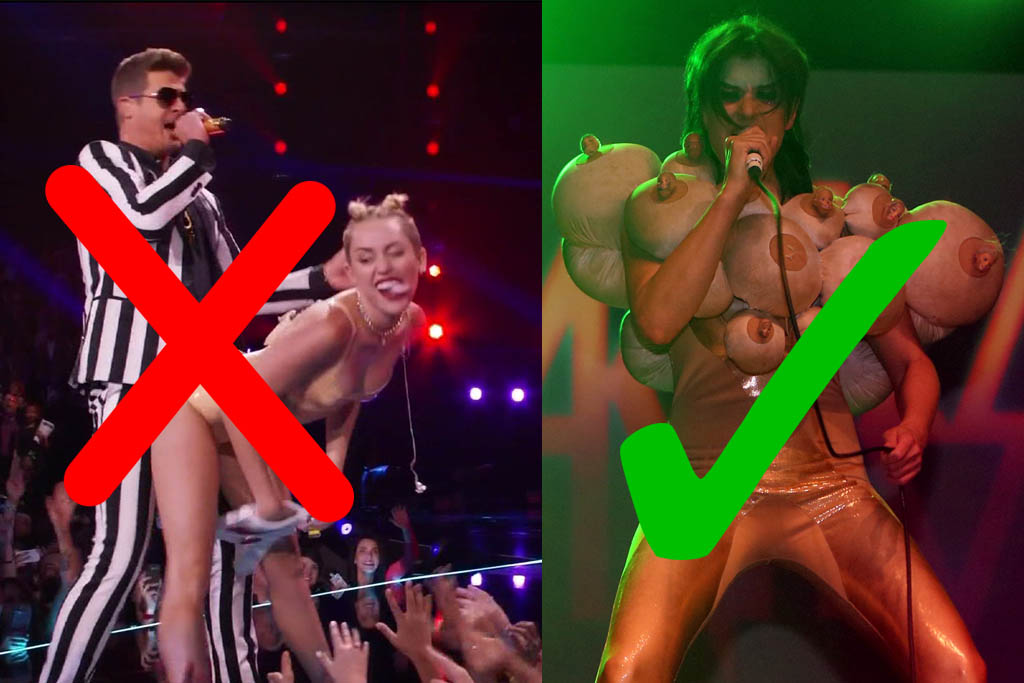How To Write A Dirty Song
We deserve a higher class of smutty music. Follow these simple rules to avoid some common pitfalls.

Jason Derulo’s latest hit (featuring 2 Chainz), ’Talk Dirty’, continues to make a splash. The song, released in January this year, peaked at number one on the Australian charts and recently Derulo performed a ‘racy’ version of it at the Billboard Music Awards — some have even questioned whether his performance was just a bit too dirty.
There’s nothing better than a good song about sex, but as an aficionado of dirty music, Talk Dirty is disappointing. The song is about Derulo sleeping with women all over the world. There are language barriers between them, but that doesn’t matter, because their bodies speak for themselves.
The song is laced with both racist and sexist stereotypes. Derulo exoticises foreign women through the lyrics and film clip, placing them into a range of offensive stereotypes. The worst bit comes at the start and the end of the song, when an Asian woman struggles to say Derulo’s name (which for some reason happens at the start of all his songs) and then proclaims “I don’t understand” at the end. The song portrays an ‘unsettling power disparity’, in which Derulo is offered a ‘sexual buffet’. It works on the assumption that foreign women want to sleep with him just because he’s famous – obviously, they don’t have a say in this at all. Add in lines such as “Sold our arenas, you can suck my penis” — from 2 Chainz, of course — and ‘Talk Dirty’ loses any sense of sexiness and actually gets a bit creepy.
So, to make up for Derulo’s failure, here are some tips — how to write a good dirty song, and how to avoid the pitfalls of the awful dirty music we’ve all heard.
1) Don’t Condone Rape Or Sexual Abuse
You’d think this would be an obvious rule, but apparently not. Rape and sexual abuse is still something that many artists are happy to dabble in (lyrically).
Just take a look at Robin Thicke’s hit song song from last year ‘Blurred Lines’. ‘Blurred Lines’ is about the apparent ‘murkiness’ that exists when it comes to consent. Thicke sings, “I know you want it, you’re a good girl”. Then comes the classy line, “I’ll give you something big enough to tear your ass in two”. This is a song about anally raping a woman, a woman who actually wants the sex, but is too much a ‘good girl’ to say yes. Thicke has actually admitted to this, saying that he was trying to do everything ‘that is completely derogatory to women’. While Thicke says it was an attempt at turn this degradation on its head, it simply comes across as condoning rape rather than challenging it.
If you thought that was bad, how about a song about raping slaves? Well, that’s what the Rolling Stones’ ‘Brown Sugar’, seems to be about. Read these lyrics:
Old coast slave ship bound for cotton fields
Sold in a market down in New Orleans
Scarred old slaver knows he’s doing alright
Hear him with the women just around midnight
Brown sugar, how come you taste so good?
Brown sugar, just like a young girl should
It’s difficult to know what Jagger was thinking when he wrote this, and he has since said that he would probably not write a song like it again. But even if it was designed as a repudiation of rape and slavery (it’s hard to tell), the song is unmistakably about a white slave owner who is lusting after a black woman, which makes it problematic either way.
Here’s a pro tip, if you’re going to write a song repudiating rape, you probably shouldn’t do it with an upbeat rock tempo.
2) Don’t Be Racist, Sexist, Or Homophobic
Tip number two flows on nicely from tip number one. Again it’s a basic one, but one that gets broken all the time in the music industry. Rap and hip-hop music in the United States, for example, has had well-documented problems with sexism and homophobia. British artist Lily Allen courted controversy this year, due to the racist undertones of the ‘Hard Out Here’ film clip.
And while of course this all needs to be challenged, in many ways it is even more important when it comes to sex. Sex and power go hand in hand, and stereotypes around race, queerness and sex are still prominent in sexual discourse. Try to bear that in mind when you’re writing your sexy new jam.
One of the important things here is that men need to recognise that they actually have a greater responsibility here. We live in a world dominated by men and it is therefore up to men to take much greater care in avoiding that sort of degradation, particularly when they are singing about women.
3) Try To Avoid The Stereotypes
It’s an unfortunate reality that in the music industry, stereotypes still dominate. Men are dominant, women are passive. Men are there to be pleased, and women are only there to do the pleasing. The stereotypes are not only oppressive, they’re also just not particularly sexy. It’s best to avoid them at all costs.
There are some amazing artists who have done a great job at turning these sorts of stereotypes around. For example, in their songs ‘Two Guys (For Every Girl)’ and ‘My Neck, My Back’, Peaches and Khia respectively have turned around the masculine/feminine and dominant/passive stereotypes. Peaches sings about a woman who refuses to have sex with a man unless he’s willing to do it with another guy at the same time, whilst Khia sings about a man going down on her. These songs both empower women and dramatically flip around our ideas of what sex is about: they’re also pretty damn sexy.
–
4) Actually Be Sexy
This is probably the most difficult rule to enforce, but it’s also the most important. Dirty music isn’t good unless it’s actually sexy. Of course that’s extremely hard to judge — sexiness is different for different people. But at the same time, you can pick out an un-sexy dirty song from a mile away.
Take Wynter Gordon’s ‘Dirty Talk‘ for example. There’s nothing substantively wrong with Gordon’s song. It isn’t racist, sexist or homophobic and it doesn’t include any rape. It’s quite catchy, too, but it really fails the sexy test. In the song, Gordon proclaims that she isn’t an angel and that she likes it when you dirty talk to her. So far, so good. But then all she does is proceed to list ‘dirty words’, some of which aren’t even that dirty (‘champagne’? Really?). It’s a pretty basic rule really – singing a list, no matter what the words are, just isn’t sexy at all.
Another way people often miss the sexy mark is through the overuse of euphemisms in their music — to the point where you don’t even know what they’re talking about. There are plenty of these songs around — ones that are so subtle that you hardly know it’s about sex. Of course, that doesn’t mean these songs are all bad, but I reckon if you want to make a dirty song sometimes you have to be a bit more direct. And of course, on the other side, euphemisms don’t necessarily stop a song from being sexy. Just look at Ginuwine’s ‘Pony‘. The lyric, “If you’re horny, let’s do it, ride it, my pony” says it all, really. It’s not exactly subtle, but it’s definitely sexy.
So how do you judge this? Well, the best sort of dirty song is the kind that you know that you could have sex to. The kind that makes you turned on just from reading the lyrics. If that doesn’t happen, maybe you should be re-thinking your approach.
The Rules!
Well there are the four rules. In the end they can probably all be condensed into one simple rule: ‘Don’t be a jerk’. Don’t have racism, sexism or queerphobia in your music. Don’t sing positively about rape or any form of domestic violence. And actually make your songs sexy. Talk about the sex rather than trying to be coy about it, and if you’re going to use innuendo, then make it at least somewhat clear what you’re talking about.
So much of our dirty music misses the mark, but I reckon we can do better.
–
